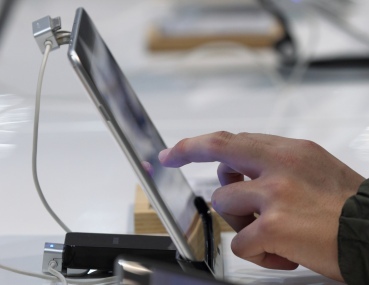SKT fined the largest amount of 20.25 billion won
The nation’s antitrust watchdog said Thursday that it imposed fines totaling 45.33 billion won ($39 million)on local handset makers and telecom carriers for inflating cell phone prices via a deceptive pricing policy.
According to the Fair Trade Commission, almost all the major players in the telecom market have colluded to inflate the supply prices of cell phones for years while advertising they were offering cheaper deals through subsidy plans.

SK Telecom was fined with the largest amount of 20.25 billion won, followed by Samsung with 14.28 billion won, KT with 5.14 billion won, LG Uplus with 2.98 billion won, LG with 2.18 billion won and Pantech with 500 million won.
Between 2008 and 2010, the nation’s three telecom carriers had set the selling prices of 44 handset models at an average 225,000 won higher than their factory prices.
Giving a subsidy worth far less than the price difference, they advertised that they were offering discount deals for high-end cell phones.
Handset makers also agreed to inflate their factory prices and share the subsidy with an aim to add a premium image to their products.
And their shady deals directly affected local consumers as they consider the amount of a subsidy one of the most important factors when purchasing a cell phone.
For example, a hit phone’s factory price in Korea was 313,000 won higher than the price for overseas markets due to the prevalent subsidy practice in Korea.
When it comes to Apple’s iPhone, however, the FTC said it found no attempts of offering a subsidy or inflating factory prices for sales in Korea.
“Under the current sales structure, in which handsets and telecom services have been combined, it is very difficult for consumers to understand the pricing policy,” a FTC official said.
“This is an ‘illusion marketing’ that abuses consumer’s trust.”
Meanwhile, companies complained about FTC’s investigation result, saying that a subsidy campaign is widely adopted as part of marketing tools across industries.
“They did not consider that a subsidy accelerates competition in the market and benefits consumers,” said a SKT spokesperson.
“According to the FTC’s logic, it would be considered normal if handset manufacturers seek margins from high supply prices, while it’s abnormal if they spend some of the profits as a subsidy for consumers.”
The nation’s No. 1 telecom carrier also raised the problem of double regulations with the FTC’s probe, claiming that network operators have already been regulated by the Korea Communications Commission.
By Lee Ji-yoon
(jylee@heraldcorp.com)







